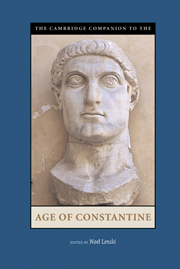Book contents
- Frontmatter
- Introduction
- 1 Sources for the History of Constantine
- Section 1 Politics and Personalities
- Section II Religion and Spiritual Life
- Section III Law and Society
- Section IV Art and Culture
- Section V Empire and Beyond
- Appendix 1: Stemmata
- Appendix 2: Timeline
- Maps
- Primary Sources and Translations
- Secondary Bibliography
- Index
1 - Sources for the History of Constantine
Published online by Cambridge University Press: 28 September 2007
- Frontmatter
- Introduction
- 1 Sources for the History of Constantine
- Section 1 Politics and Personalities
- Section II Religion and Spiritual Life
- Section III Law and Society
- Section IV Art and Culture
- Section V Empire and Beyond
- Appendix 1: Stemmata
- Appendix 2: Timeline
- Maps
- Primary Sources and Translations
- Secondary Bibliography
- Index
Summary
What we can know about the history of an emperor is entirely dependent on our source base. For our knowledge of Constantine, the situation is actually quite favorable considering the usual standards in ancient history. To be sure, there is no longer extant a full-scale ancient historical work for the rule of Constantine. The historian finds compensation, however, in a large number of other sources whose breadth and complexity have made the treatment of the historical problem of Constantine’s reign into something of a proving ground for ancient historical method. This method consists primarily in using the sources available to document a state of affairs in the most comprehensive way possible and then setting those sources in relation to one another, as for example through hierarchization.
To offer one example, the ancient historian could not settle the question whether Constantine the Great suddenly became Christian in the fall of 312 after the battle of the Milvian Bridge by looking only at the ecclesiastical historians of the fifth century, who preserve the well-known legend, often repeated into modern times, that Constantine saw a cross in the heavens before his victory over Maxentius and converted to Christianity out of gratitude for his success. On the contrary, he must investigate the origin of the legend and explain why already the contemporary Eusebius included this report in his Life of Constantine (Vita Constantini).
- Type
- Chapter
- Information
- The Cambridge Companion to the Age of Constantine , pp. 14 - 32Publisher: Cambridge University PressPrint publication year: 2005
- 4
- Cited by

